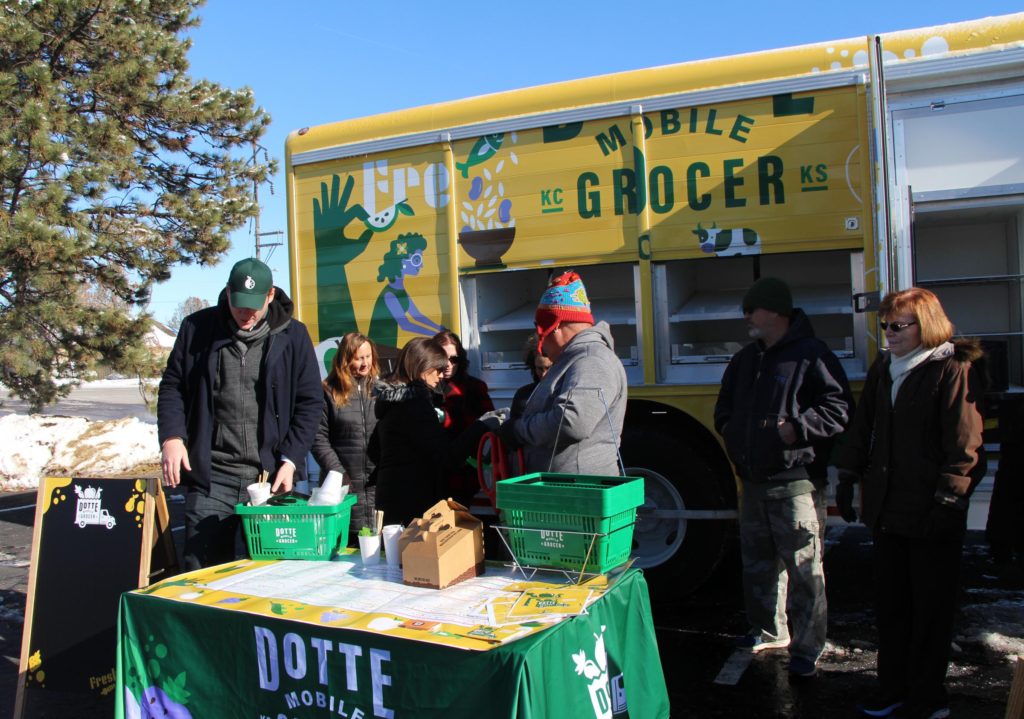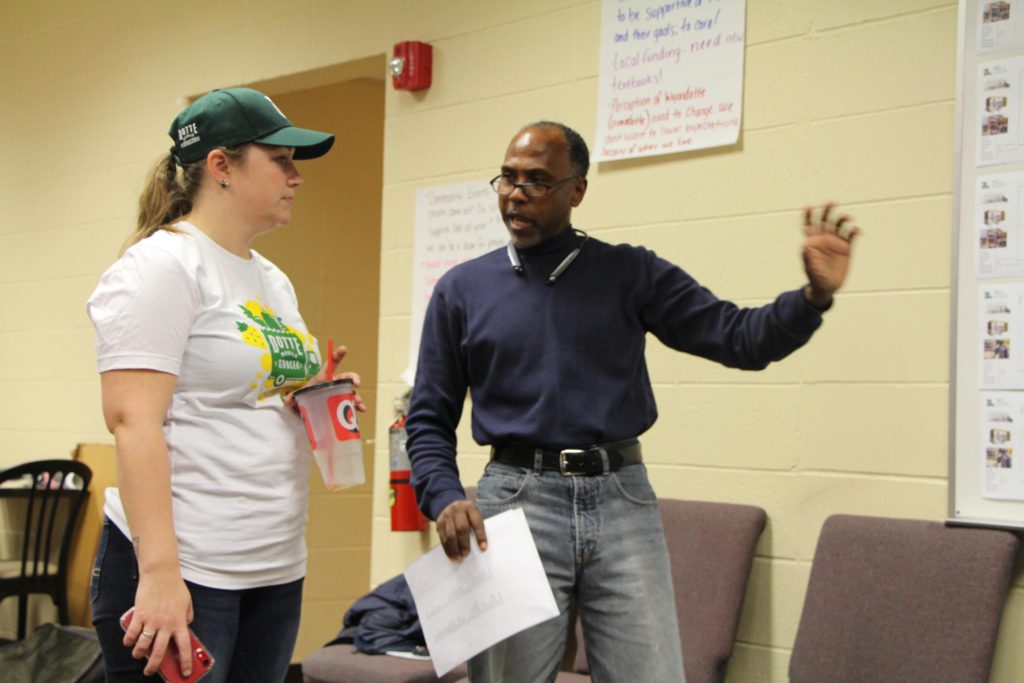
Community council members, organizers and others gather at the Dotte Mobile Grocer’s soft launch in November. Members hope the community council gives this food desert-busting initiative more staying power than other attempts to run a grocery on wheels. (Photo by Madeline Fox, Kansas News Service)
by Madeline Fox, Kansas News Service
Every Wednesday night, some Wyandotte County residents gather in the back room of a community health center in Kansas City, Kansas.
On gridded sheets taped to a whiteboard, sometimes they scribble classic grocery store items — milk, cheese, meat.
The Dotte Mobile Grocer’s Mobile Market Community Council figures getting locals involved in the details means everything to the success of its grocery-store-in-a-food-truck idea.
Neighborhood residents get a say in everything from how to stock shelves to where the truck will park on which days. Listening to what neighborhood shoppers need and want, goes the thinking, makes all the difference in filling pockets of the county that no longer contain any local grocers.
In theory, that rolling grocery will deliver healthy food that people in particular neighborhoods want but can’t easily get.
Dorothy McField has seen one grocery store after another disappear in her more than 80 years living in Kansas City.
“As the larger ones took over, the smaller ones got run out of business,” she said. “Then people move, things happen — the next thing you know, we don’t have any.”
Across Kansas, the closing of grocery stores has hollowed out communities and left residents stuck. They either travel impractical distances — maybe many miles in rural areas, or across multiple bus routes in cities — or get stuck with overpriced, less healthy offerings from bodegas and convenience stores.
The disappearance of grocery stores happens with regularity, shutting off the poor, especially, from the fresh produce, meat and other staples they need to eat well.
More than 800,000 Kansans don’t have easy access to fresh, affordable food.
The Dotte Mobile Grocer marks just the latest attempt at a mobile solution to an area’s food deserts. Rollin’ Grocer, a Kansas City, Missouri,-based mobile grocer, ran for a little more than a year before suspending its business in July.
Having a group of community members make even the smallest decisions about the Dotte Mobile Grocer can be time-consuming. It took the council members more than half an hour to write in just where to shelve things on a single refrigerated panel of the truck.
But, its backers suggest, having a large group of locals invested in the truck’s success is key to avoiding a fate like that of the Rollin’ Grocer.
Kolia Souza, a food systems development specialist in Kansas, called community-driven solutions the underpinning of successful fixes for poor food access.
More local people invested in a project’s success means more folks determined to prevent its failure. Operators hope that means they’ll stick around and make it work, even if nonprofit help or grants run out.
It also guards against local frustration at out-of-towners parachuting in with a fix that might not reflect what the community wants.
“Communities like ours are wary of outside — not even just outside, but well-intentioned people — saying, ‘I’ve identified a problem,’” said Mary Collins, a member of the Dotte Mobile Grocer’s community council. “Without really considering, ‘What do you think you need?’”

The mobile grocer model won’t work in all of Kansas’ food-scarce areas. In Kansas City, a truck can hit 15 food-starved spots, and 44,000 people, without traveling vast distances.
In more spread-out, rural communities, much more of the day would have to be spent driving from one location to the next. That would mean less time selling — and much tighter margins in an industry where profits turn on selling large quantities.
In Kansas towns smaller than 2,500 people, nearly one in five grocery stores closed between 2008 and 2015.
Grocery trucks can’t replace all those stores. So Souza works with food policy councils similar to the Dotte Mobile Grocer’s group of locals across the state to unlock other ideas.
For some, that means small, struggling grocery stores piggybacking on a neighboring town’s larger store, and more robust buying power, to hit purchasing minimums. In other places, it’s community gardens tended by a school and woven into class lessons.
Kansas is actually ahead of other states when it comes to big-picture thinking about food access, said Tina Khan, who works with the Kansas Alliance for Wellness to help develop local food systems.
“Kansas is really leading the way in, ‘Let’s look at that entire food system’ — aggregation, production, consumption, distribution, access,” she said.
That puts it ahead of states still trying to get farmers’ markets running. But even the solutions communities have come up with, like the Dotte Mobile Grocer, aren’t comprehensive.
“We’re not there yet,” Khan said.
Matt Kleinmann is a doctoral student at the University of Kansas. He helped come up with the mobile grocer idea and facilitates the community council. Kleinmann said the truck’s operation is fully funded by grants that will last through its first year. After that, organizers will have to make their case to health and community foundations for more money.
Grocery stores have to move a lot of merchandise to make money because products aren’t marked up as high as merchandise such as clothing or electronics.
With the size limitations of a truck, it’s hard to hit that kind of volume. Add in the non-selling hours of loading and unloading, and the cost of running the truck from stop to stop, and it’s hard for mobile markets to turn a profit, said Lucas Signorelli, executive director of St. Louis’s MetroMarket.
“I haven’t heard of anyone doing it profitably,” he said, “and we’re decently well-networked with other mobile markets around the country.”
The Dotte Mobile Grocer’s projected January open date might not do it any favors. Signorelli said their grocery bus suspends service from Thanksgiving to April because foot traffic slows down in the cold weather, and they’re worried about asking drivers to load, unload and sell in cold, icy conditions.
“Winters in a mobile market are really long and hard,” he said.
Signorelli also said he’s not heard of any mobile market that’s profitable just based on grocery sales. They all get by with grants.
A mobile grocer doesn’t replace a fully-stocked, permanent grocery store.
“I don’t think it’s gonna be the permanent solution,” said McField, the longtime resident. “But for right now, it’s beautiful.”
Plans are already underway for The Merc, a grocery co-op, to open a store in downtown Kansas City, Kansas, and there’s talk of more brick-and-mortar stores moving into the county.
Collins, the community council member, said she’s excited — not worried — about the idea of the Dotte Mobile Grocer becoming obsolete if permanent stores move in. She said the truck could perhaps be retrofitted again, and become a transport for people with limited mobility to their nearest full-line grocery store.
“If nobody needs to come to the mobile market to get their groceries anymore,” she said, “you know what? That’s a success to me.”
Madeline Fox is a reporter for the Kansas News Service, a collaboration of KCUR, Kansas Public Radio, KMUW and High Plains Public Radio covering health, education and politics. You can reach her on Twitter @maddycfox.
Kansas News Service stories and photos may be republished at no cost with proper attribution and a link to ksnewsservice.org.
See more at https://www.kcur.org/post/mobile-grocer-hopes-listening-locals-will-help-fill-kansas-food-desert
